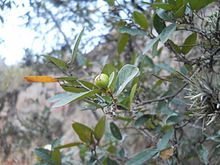Sebastiania
| Sebastiania | |
|---|---|

| |
| Scientific classification | |
| Kingdom: | Plantae |
| Clade: | Tracheophytes |
| Clade: | Angiosperms |
| Clade: | Eudicots |
| Clade: | Rosids |
| Order: | Malpighiales |
| Family: | Euphorbiaceae |
| Subfamily: | Euphorbioideae |
| Tribe: | Hippomaneae |
| Subtribe: | Hippomaninae |
| Genus: | Sebastiania Spreng. |
| Synonyms[1] | |
| |
Sebastiania is a genus of flowering plants in the family Euphorbiaceae first described in 1821.[2][3] It is native to North and South America from Arizona and the West Indies south to Uruguay.[1][4][5][6][7][8]
Species[]
As of 2020 Kew's Plants of the World Online accepts 60 species in the genus Sebastiania.[9] Many species formerly included in this genus are now placed in genera such as Actinostemon, Bonania, Chrysanthellum, Dendrocousinsia, Ditaxis, Ditrysinia, Gymnanthes, Microstachys, Phyllanthus, Sapium, and Stillingia.
- Sebastiania argutidens Pax & K.Hoffm.
- Sebastiania bahiensis (Müll.Arg.) Müll.Arg.
- Sebastiania bicalcarata (Müll.Arg.) Pax
- Sebastiania brasiliensis Spreng.
- Sebastiania brevifolia (Müll.Arg.) Müll.Arg.
- Sebastiania catingae Ule
- Sebastiania chaetodonta Müll.Arg.
- Sebastiania chahalana Lundell
- Sebastiania chiapensis Lundell
- Sebastiania cruenta (Standl. & Steyerm.) Miranda
- Sebastiania daphniphylla (Baill.) Müll.Arg.
- Sebastiania dimorphocalyx Müll.Arg.
- Sebastiania echinocarpa Müll.Arg.
- Sebastiania eglandulata (Vell.) Pax
- Sebastiania glabrescens Pax & K.Hoffm.
- Sebastiania glandulosa (Sw.) Müll.Arg.
- Sebastiania gracilis Pax & K.Hoffm.
- Sebastiania haploclada Briq.
- Sebastiania heteroica Müll.Arg.
- Sebastiania hexaptera Urb.
- Sebastiania hintonii Lundell
- Sebastiania integra (Fawc. & Rendle) A.L.Melo & M.F.Sales
- Sebastiania jacobinensis (Müll.Arg.) Müll.Arg.
- Sebastiania jaliscensis McVaugh
- Sebastiania klotzschiana (Müll.Arg.) Müll.Arg.
- Sebastiania larensis Croizat & Tamayo
- Sebastiania laureola (Baill.) Müll.Arg.
- Sebastiania leptopoda Lundell
- Sebastiania longispicata Pax & K.Hoffm.
- Sebastiania macrocarpa Müll.Arg.
- Sebastiania mosenii Pax & K.Hoffm.
- Sebastiania obtusifolia Pax & K.Hoffm.
- Sebastiania pachyphylla Pax & K.Hoffm.
- Sebastiania pachystachya (Klotzsch) Müll.Arg.
- Sebastiania panamensis G.L.Webster
- Sebastiania pavoniana (Müll.Arg.) Müll.Arg.
- Sebastiania picardae Urb.
- Sebastiania potamophila (Müll.Arg.) Pax
- Sebastiania pteroclada (Müll.Arg.) Müll.Arg.
- Sebastiania pubescens Pax & K.Hoffm.
- Sebastiania pubiflora Lundell
- Sebastiania pusilla Croizat
- Sebastiania ramulosa Pax & K.Hoffm.
- Sebastiania rhombifolia Müll.Arg.
- Sebastiania riedelii Müll.Arg.
- Sebastiania rigida (Müll.Arg.) Müll.Arg.
- Sebastiania riparia Schrad.
- Sebastiania rotundifolia Pax & K.Hoffm.
- Sebastiania rupicola Pax & K.Hoffm.
- Sebastiania schottiana (Müll.Arg.) Müll.Arg.
- Sebastiania serrata (Baill. ex Müll.Arg.) Müll.Arg.
- Sebastiania subsessilis (Müll.Arg.) Pax
- Sebastiania subulata (Müll.Arg.) Pax
- Sebastiania trichogyne Pax & K.Hoffm.
- Sebastiania trinervia (Müll.Arg.) Müll.Arg.
- Sebastiania venezolana Pax & K.Hoffm.
- Sebastiania vestita Müll.Arg.
- Sebastiania warmingii (Müll.Arg.) Pax
- Sebastiania weddelliana (Baill.) Müll.Arg.
- Sebastiania ypanemensis (Müll.Arg.) Müll.Arg.
References[]
- ^ Jump up to: a b Kew World Checklist of Selected Plant Families
- ^ Sprengel, Curt Polycarp Joachim. 1821. Neue Entdeckungen im Ganzen Umfang der Pflanzenkunde 2: 118, pl. 3 in Latin
- ^ Tropicos Sebastiania Spreng.
- ^ CONABIO. 2009. Catálogo taxonómico de especies de México. 1. In Capital Nat. México. CONABIO, Mexico D.F..
- ^ García-Mendoza, A. J. & J. A. Meave. 2011. Diversidad Florística de Oaxaca: de Musgos a Angispermas 1–351. Universidad Nacional Autónoma de México, Ciudad Universitaria
- ^ Forzza, R. C. 2010. Lista de espécies Flora do Brasil http://floradobrasil.jbrj.gov.br/2010. Jardim Botânico do Rio de Janeiro, Rio de Janeiro
- ^ Martínez Gordillo, M., J. J. Ramírez, R. C. Durán, E. J. Arriaga, R. García, A. Cervantes & R. M. Hernández. 2002. Los géneros de la familia Euphorbiaceae en México. Anales del Instituto de Biología de la Universidad Nacional Autónoma de México, Botánica 73(2): 155–281.
- ^ Webster, G. L. & M.J. Huft. 1988. Revised synopsis of Panamanian Euphorbiaceae. Ann. Missouri Bot. Gard. 75(3): 1087–1144
- ^ "Sebastiania Spreng". Plants of the World Online. Royal Botanic Gardens, Kew. Retrieved 29 September 2020.
Categories:
- Sebastiania
- Euphorbiaceae genera
- Euphorbiaceae stubs